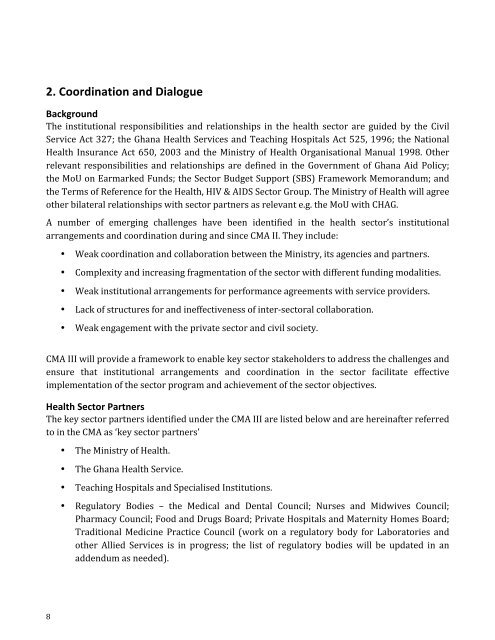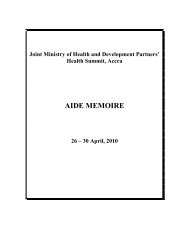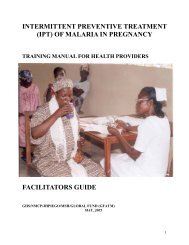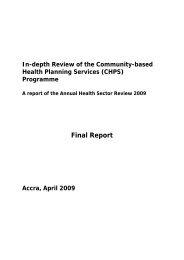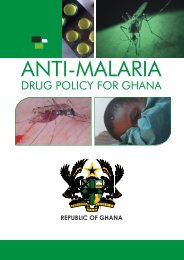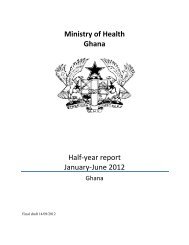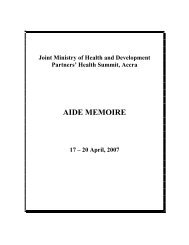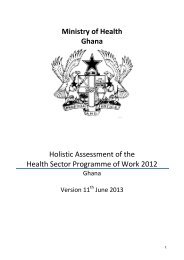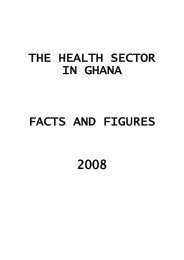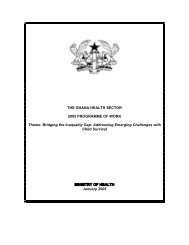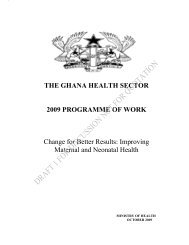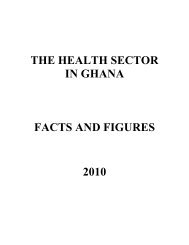REVISED CMA III - Ministry of Health
REVISED CMA III - Ministry of Health
REVISED CMA III - Ministry of Health
You also want an ePaper? Increase the reach of your titles
YUMPU automatically turns print PDFs into web optimized ePapers that Google loves.
2. Coordination and Dialogue <br />
Background <br />
The institutional responsibilities and relationships in the health sector are guided by the Civil <br />
Service Act 327; the Ghana <strong>Health</strong> Services and Teaching Hospitals Act 525, 1996; the National <br />
<strong>Health</strong> Insurance Act 650, 2003 and the <strong>Ministry</strong> <strong>of</strong> <strong>Health</strong> Organisational Manual 1998. Other <br />
relevant responsibilities and relationships are defined in the Government <strong>of</strong> Ghana Aid Policy; <br />
the MoU on Earmarked Funds; the Sector Budget Support (SBS) Framework Memorandum; and <br />
the Terms <strong>of</strong> Reference for the <strong>Health</strong>, HIV & AIDS Sector Group. The <strong>Ministry</strong> <strong>of</strong> <strong>Health</strong> will agree <br />
other bilateral relationships with sector partners as relevant e.g. the MoU with CHAG. <br />
A number <strong>of</strong> emerging challenges have been identified in the health sector’s institutional <br />
arrangements and coordination during and since <strong>CMA</strong> II. They include: <br />
• Weak coordination and collaboration between the <strong>Ministry</strong>, its agencies and partners. <br />
• Complexity and increasing fragmentation <strong>of</strong> the sector with different funding modalities. <br />
• Weak institutional arrangements for performance agreements with service providers. <br />
• Lack <strong>of</strong> structures for and ineffectiveness <strong>of</strong> inter-‐sectoral collaboration. <br />
• Weak engagement with the private sector and civil society. <br />
<strong>CMA</strong> <strong>III</strong> will provide a framework to enable key sector stakeholders to address the challenges and <br />
ensure that institutional arrangements and coordination in the sector facilitate effective <br />
implementation <strong>of</strong> the sector program and achievement <strong>of</strong> the sector objectives. <br />
<strong>Health</strong> Sector Partners <br />
The key sector partners identified under the <strong>CMA</strong> <strong>III</strong> are listed below and are hereinafter referred <br />
to in the <strong>CMA</strong> as ‘key sector partners’ <br />
• The <strong>Ministry</strong> <strong>of</strong> <strong>Health</strong>. <br />
• The Ghana <strong>Health</strong> Service. <br />
• Teaching Hospitals and Specialised Institutions. <br />
• Regulatory Bodies – the Medical and Dental Council; Nurses and Midwives Council; <br />
Pharmacy Council; Food and Drugs Board; Private Hospitals and Maternity Homes Board; <br />
Traditional Medicine Practice Council (work on a regulatory body for Laboratories and <br />
other Allied Services is in progress; the list <strong>of</strong> regulatory bodies will be updated in an <br />
addendum as needed). <br />
8


